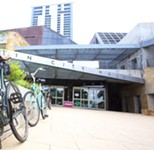CodeNEXT Petition Hearing Awaits Ruling
Decision must be made before Aug. 20 to impact November election
By Sarah Marloff, 5:24PM, Mon. Jul. 2, 2018
Travis County District Court Judge Orlinda Naranjo spent Monday morning presiding over Austin’s land use petition case, but dismissed the court before 1pm without issuing a ruling. With a deadline looming – a decision must be made before Aug. 20 in order to have an effect on the November election – Naranjo promised to rule soon.
The lawsuit was filed against the City by a group of anti-CodeNEXT community members on June 1, following City Council’s vote to not put the petition – which called for a waiting period and public vote on CodeNEXT (and all future comprehensive zoning rewrites) – to a public vote. However, the five council members and Mayor Steve Adler who voted against the petition did so with the intention of bringing about a lawsuit that would force a judge to weigh in on the petition’s legality. Specifically: whether or not state law allows residents to vote on zoning ordinances.
Attorneys Bill Bunch and Fred Lewis – two plaintiffs in the case – argued in favor of the petition (which Lewis helped author), while Jane Webre, a lawyer with local firm Scott, Douglass & McConnico, represented the city. Both sides agree the proposed land use code covers both zoning and non-zoning issues, and that no one knows what the code rewrite will actually entail because, currently, there is no final draft. Because the rewrite remains in draft form, and likely will for some time, Lewis argued that November’s election would have nothing to do with zoning law. In fact, if Naranjo rules in favor of the plaintiffs, voters will decide whether or not to enact a waiting period before CodeNEXT could be implemented, if approved by both Council and voters (at a future, undetermined election).
Much of both sides’ arguments waded into complicated case law dating as far back as the 1920s, and attempted to decipher state legislature limitations and allowances. Lewis said not putting the petition on the ballot, after gathering more than the required 20,000 signatures, “violates” the “people’s power.” In closing, he voiced his belief that CodeNEXT – as it’s proposed today – would displace more Austinites and “destroy neighborhoods.” Residents, he said, “deserve the right to be heard … this is not about CodeNEXT, this is about democracy.”
The plaintiffs’ case also relied heavily on the rewrite’s lack of completion, arguing that CodeNEXT is not inherently about zoning because Council’s intentions are not yet clear. Lewis suggested Council could decide to continue with the city’s current zoning, while Bunch called the draft three’s zoning chapter a “small part” of the rewrite.
But Webre, using what she called a “road map” of the case, argued that, in the majority of situations, state law does not allow residents to vote on zoning issues. Webre approximates that draft three’s zoning chapter (totalling more than 600 pages of the 1,565 page document) takes up 45% of the rewrite, but emphasized the “tentacles of zoning” are felt throughout the draft. Therefore, she said, it's all but impossible to separate zoning from the rest of the code.
Furthermore, Webre argued that while Texas law allows for the voter-led right to initiate legislation or repeal existing ordinances if the City Council refuses to do so (known as the initiative and referendum process), some “subject matter” has been deemed inappropriate for that process. Zoning, as argued by the city, is one of those subjects. In legalese, zoning is exempt from referendum because it requires mandatory procedures under state law. As such, both city Planning Commissions and Councils are required to hold public hearings, which have been publicly posted, for each zoning case, due to the technical nature of zoning, and because “you can’t have a hearing before the entire electorate,” said Webre. This, she said, is why Council voted to keep the petition off the ballot and why her team has asked Narajano to affirm that decision.
It’s uncertain when Narajano will rule, but as she dismissed the court Monday afternoon she acknowledged both the upcoming holiday and truncated timeline. “I understand we’re working with a short fuse,” she closed.
See Thursday’s print issue for more on the lawsuit.
Got something to say on the subject? Send a letter to the editor.
A note to readers: Bold and uncensored, The Austin Chronicle has been Austin’s independent news source for over 40 years, expressing the community’s political and environmental concerns and supporting its active cultural scene. Now more than ever, we need your support to continue supplying Austin with independent, free press. If real news is important to you, please consider making a donation of $5, $10 or whatever you can afford, to help keep our journalism on stands.
Mike Clark-Madison, May 9, 2019
Sarah Marloff, Aug. 1, 2018
March 8, 2024
Bill Bunch, Fred Lewis, Jane Webre, Orlinda Naranjo, CodeNEXT










